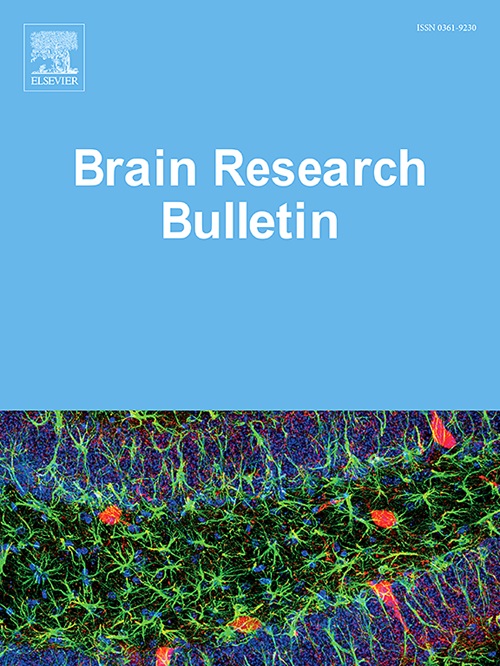Unraveling the nexus: Sleep's role in ferroptosis and health
IF 3.7
3区 医学
Q2 NEUROSCIENCES
引用次数: 0
Abstract
Sleep is an important physiological process to maintain physiological health, which involves the regulation of many systems in the body, which is not only closely related to hormone balance, immune system and nervous system function in the body. Recent studies have emphasized the complex relationship between sleep and cell death mechanisms. Ferroptosis is a form of iron-dependent cell death, which is related to a variety of neurodegenerative diseases. Sleep plays an important role in regulating brain metabolism, immune function and overall intracellular homeostasis. New evidence suggests that there is a two-way interaction between sleep and ferroptosis. Sleep interruption may enhance the ferroptosis pathway, which in turn may change the quality of sleep. Understanding this interaction is essential to reveal the underlying mechanisms of neurodegeneration and to develop potential therapeutic interventions.
This review combines the results of current studies on the molecular and cellular mechanisms of ferroptosis and the extensive role of sleep in brain health. Special attention is paid to the effects of sleep deprivation on iron metabolism and oxidative stress, which play an important role in ferroptosis. The review also explores the role of sleep in regulating iron homeostasis and how sleep disorders promote iron accumulation in the brain, which may accelerate the process of ferroptosis.
Sleep disorders, especially chronic sleep deprivation, may create a favorable environment for ferroptosis by affecting iron metabolism and oxidative stress levels in the brain. Conversely, cell death associated with siderosis disrupts normal sleep patterns, forming a circulatory relationship that exacerbates neurodegenerative diseases. Understanding the complex mechanisms of sleep and ferroptosis will provide valuable insights into aging and age-related diseases. In addition, the pathways involved in sleep regulation and ferroptosis can provide new methods for the prevention and treatment of neurodegenerative diseases and other ferroptosis-related pathology.
解开关系:睡眠在铁下垂和健康中的作用。
睡眠是维持生理健康的重要生理过程,涉及到机体多个系统的调节,不仅与机体的激素平衡、免疫系统和神经系统功能密切相关。最近的研究强调了睡眠与细胞死亡机制之间的复杂关系。铁下垂是铁依赖性细胞死亡的一种形式,与多种神经退行性疾病有关。睡眠在调节脑代谢、免疫功能和整体细胞内稳态中起着重要作用。新的证据表明,睡眠和铁下垂之间存在双向相互作用。睡眠中断可能增强铁下垂通路,进而可能改变睡眠质量。了解这种相互作用对于揭示神经退行性疾病的潜在机制和开发潜在的治疗干预措施至关重要。本文综述了目前关于铁下垂的分子和细胞机制的研究结果以及睡眠在大脑健康中的广泛作用。特别关注睡眠剥夺对铁代谢和氧化应激的影响,这在铁下垂中起重要作用。本文还探讨了睡眠在调节铁稳态中的作用,以及睡眠障碍如何促进铁在大脑中的积累,从而加速铁凋亡的过程。睡眠障碍,特别是慢性睡眠剥夺,可能通过影响大脑中的铁代谢和氧化应激水平,为铁下沉创造有利的环境。相反,与铁质沉着症相关的细胞死亡破坏了正常的睡眠模式,形成了一种循环关系,加剧了神经退行性疾病。了解睡眠和铁下垂的复杂机制将为衰老和与年龄相关的疾病提供有价值的见解。此外,睡眠调节和铁下垂的相关通路可以为神经退行性疾病和其他铁下垂相关病理的预防和治疗提供新的方法。
本文章由计算机程序翻译,如有差异,请以英文原文为准。
求助全文
约1分钟内获得全文
求助全文
来源期刊

Brain Research Bulletin
医学-神经科学
CiteScore
6.90
自引率
2.60%
发文量
253
审稿时长
67 days
期刊介绍:
The Brain Research Bulletin (BRB) aims to publish novel work that advances our knowledge of molecular and cellular mechanisms that underlie neural network properties associated with behavior, cognition and other brain functions during neurodevelopment and in the adult. Although clinical research is out of the Journal''s scope, the BRB also aims to publish translation research that provides insight into biological mechanisms and processes associated with neurodegeneration mechanisms, neurological diseases and neuropsychiatric disorders. The Journal is especially interested in research using novel methodologies, such as optogenetics, multielectrode array recordings and life imaging in wild-type and genetically-modified animal models, with the goal to advance our understanding of how neurons, glia and networks function in vivo.
 求助内容:
求助内容: 应助结果提醒方式:
应助结果提醒方式:


